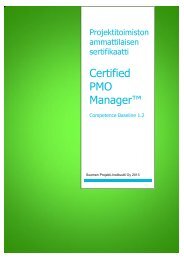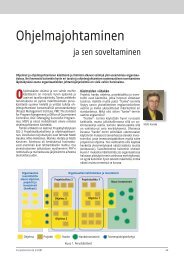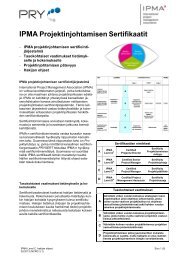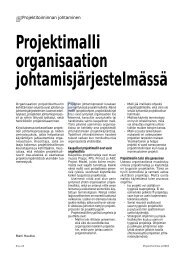Boundary activities and readiness for ... - Projekti-Instituutti
Boundary activities and readiness for ... - Projekti-Instituutti
Boundary activities and readiness for ... - Projekti-Instituutti
Create successful ePaper yourself
Turn your PDF publications into a flip-book with our unique Google optimized e-Paper software.
198<br />
Discussion<br />
program initiation <strong>and</strong> recoupling it at the end of the program, the findings<br />
suggest that integration <strong>and</strong> isolation coexist. The study proposes that there<br />
is a constant search <strong>for</strong> balance between integration – adapting to the<br />
structures, norms, <strong>and</strong> rules of the parent organization – <strong>and</strong> isolation –<br />
decoupling the program from its environment to protect its progress. It<br />
appears that the optimal level of balance may change as the program makes<br />
progress. This suggests that it is a central challenge (<strong>and</strong> correspondingly a<br />
critical capability) <strong>for</strong> the program’s managers to find <strong>and</strong> maintain the<br />
optimal level of integration (vs. isolation) towards the program’s<br />
environment in the changing situations.<br />
5.2.2 Program management in organizing <strong>and</strong> leading large-scale<br />
change<br />
Previous literature on organizational change has not clearly recognized the<br />
role of temporary organizations in delivering the change. Although seldom<br />
discussed within the field of organizational change, project management<br />
provides a systematic methodology <strong>for</strong> dividing complex change ef<strong>for</strong>ts into<br />
distinct phases <strong>and</strong> manageable components, organizing the ef<strong>for</strong>ts, <strong>and</strong><br />
<strong>for</strong>mally committing top management in the roles of the project owners <strong>and</strong><br />
steering group members. The emergence of the program management<br />
approach <strong>and</strong> the related literature has brought the project management<br />
discipline closer to the disciplines of organizational change <strong>and</strong> strategic<br />
management. The current study has made an ef<strong>for</strong>t to combine the view of<br />
the project management discipline <strong>and</strong> the literature on organizational<br />
change to shed light on how complex organizational changes can be<br />
delivered by a specific <strong>for</strong>m of temporary organizations, change programs.<br />
While programs have great potential to deliver large-scale organizational<br />
change (Pellegrinelli, 1997; Vereecke et al., 2003), the successful launch<br />
<strong>and</strong> delivery of a program requires considerable ef<strong>for</strong>t. Programs have a<br />
number of characteristics that set them apart from projects, <strong>and</strong> program<br />
management extends beyond the scope of traditional project management.<br />
The st<strong>and</strong>ards <strong>for</strong> program management (Office of Government Commerce,<br />
2007; Project Management Institute, 2006) suggest certain management<br />
processes or themes to be emphasized in programs, including program<br />
governance, stakeholder management, <strong>and</strong> benefits management. These<br />
processes or themes are relevant already during the early stage of a<br />
program <strong>and</strong> they may be linked to the findings of the study.<br />
Firstly, related to program governance, complex multi-project programs<br />
require more structure <strong>and</strong> administration than single projects. Coming up<br />
with an appropriate program structure <strong>and</strong> establishing the related<br />
governance framework requires considerable ef<strong>for</strong>t. The three investigated<br />
cases showed how program governance may not be planned just among the









